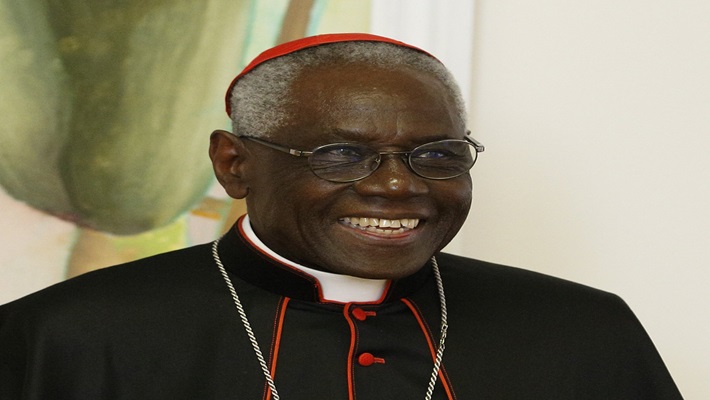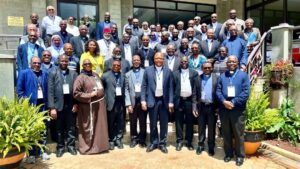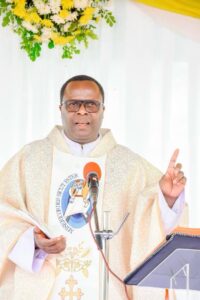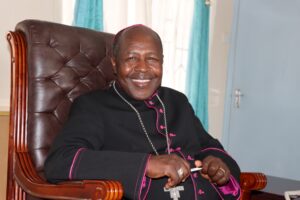KENYA: Cardinal Sarah Calls for Interfaith Synergy and Vigilance in Addressing Entrenched Religious Challenges in Africa

Cardinal Robert Sarah, head of the Congregation for Divine Worship and the Sacraments, is pictured in a file photo. (CNS photo/Paul Haring)
By Elizabeth Asasha
His Eminence Robert Cardinal Sarah, Prefect Emeritus of the Congregation for Divine Worship and the Discipline of the Sacraments (CDWDS), had called for urgent interreligious synergy and communal discernment as an antidote to the lingering wounds of division and present a cohesive witness to the Gospel.
Cardinal Sarah, a prominent figure in the Catholic Church, delivered a compelling keynote address centered on the ‘Missionary Mandate of Christ about Non-Catholic Christian denominations, traditional religions, and Islam’, drawing on his personal experiences and theological insights to highlight the key challenges posed by Christian divisions, the spread of “toxic spiritual refuse,” and the barriers to evangelization presented by Islam.
The 79-year-old Catholic prelate from the village of Ourous in French Guinea, began his address with a backdrop of divisions among Christians which stemmed from the Protestant Reformation, lamenting the enduring schisms within Christianity and emphasizing the need for concerted efforts toward reconciliation and unity as they navigate the complex religious landscape of Africa.
“If we are not one if we are divided, then our witness to Christ will be divided, and the world will not believe the Gospel,” stated the prelate at the Thursday 22nd and Friday 23rd of February Theological symposium organized by the Tangaza University College School of Theology, under the theme “Make Disciples of all Nations: The Missionary Mandate of Christ in the Religious, Cultural and Social Context of Africa Today.”
The prelate urged African Christians to uphold the primacy of divine revelation and protect the continent’s deep sense of God as he discussed the challenges posed by what he termed as “toxic spiritual refuse” exported from the supposed first world, such as gender ideology, abortion, and the normalization of homosexual unions.
“True Christian unity begins with fidelity to the divine truth found in the Word of God, sacred tradition, and the constant teaching of the magisterium,” stated Cardinal Sarah, whose leadership qualities and theological insights earned him high-ranking appointments to various positions within the Vatican hierarchy, culminating in his appointment as Prefect of the CDWDS in 2014, a position he held until February 20, 2021, when Pope Francis accepted his resignation.
Addressing Africa’s diverse Christian denominations, Cardinal Sarah urged dialogue and collaboration while cautioning against syncretism, encouraging independent Christian communities to seek unity based on Christ’s word and to avoid building on foundations other than those laid by Christ himself.
“Christ does not wield our divisions, join us in prayer and fasting, and He will gather us together,” appealed the Cardinal who has been a vocal advocate for Christian unity throughout his tenure.
Born on June 15, 1945, in Ourous, a village in French Guinea, to parents who were originally of the animist religion, before converting to Catholicism, Cardinal Sarah embraced the faith at an early, gradually developing a profound faith and commitment to the Catholic Church.
‘We were animists, whereas Islamic populations have typically resisted the Catholic faith, many former animists welcomed the missionaries, and I embraced the faith.” Archbishop Sarah, whose home hamlet is now almost entirely Christian, explained that natives continue to embrace Christianity while retaining some positive components of traditions, roots, and festivals that continue to shape their daily lives.
On this, the catholic leader advised that believers can still strike a positive interplay between religion and constructive indigenous culture without total erosion of either saying, “Evangelization did not destroy our traditional way of life but elevated and purified it in the light of the Gospel and this is how evangelization ought to work.”
He goes on to say, “We discern in the people and the cultures what is good and what is evil, what is evil we discard, and what is good remains and becomes rooted, assimilated, and integrated into the life of the Church.” The Guinean prelate who served as Prefect of the CDWDS from 2014 to 2020 acknowledged that the Gospel takes time to transform a culture.
The symposium also featured speeches from other key figures, including Archbishop Hubertus Matheus Maria van Megen, the apostolic nuncio to Kenya and South Sudan, as well as Archbishop Philip Arnold Subira Anyolo and Archbishop Maurice Muhatia Makumba, who shepherd Nairobi and Kisumu Ecclesiastes respectively.
Scholars and experts from various institutions, including Rev. Fr. Clement Majawa (CUEA), Dr. Mary Mukami from Strathmore University, and several representatives from TUC, also contributed their insights to the discussion.


